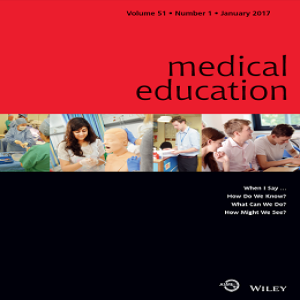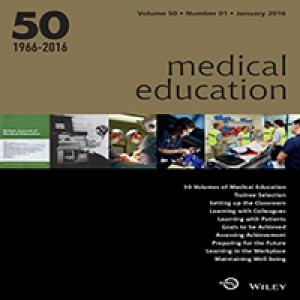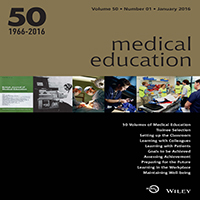Episodes

Tuesday Apr 13, 2021
Tuesday Apr 13, 2021
Noting that fundamental values not explicitly described in formal accreditation standards risk becoming lost in education practices, Chen et al. identify a troubling absence of compassionate care reflected in current standards.
Read the accompanying article to this audio paper: Competent to provide compassionate care? A critical discourse analysis of accreditation standards.

Tuesday Apr 13, 2021
Tuesday Apr 13, 2021
Curious how growth mindset has been researched in health professions education? In this review, the authors mapped research in our field, shining light on the benefits of (and strategies to promote) a growth mindset.
Read the accompanying article to this audio paper: A review to characterise and map the growth mindset theory in health professions education.

Thursday Apr 01, 2021
Thursday Apr 01, 2021
Rudland et al. explore learner neglect in medical education and report various parallels to an existing framework of child neglect.
Read the accompanying article to this podcast: Medical student learner neglect in the clinical learning environment: Applying Glaser’s theoretical model.

Thursday Apr 01, 2021
Thursday Apr 01, 2021
Medical students' intentions upon graduation are the strongest predictors of engaging subsequently in rural work, but intentions can be changed by enabling rural opportunities during training.
Read the accompanying article to this podcast: Intention mutability and translation of rural intention into actual rural medical practice.

Monday Mar 15, 2021
Monday Mar 15, 2021
Countering claims of tension between theory and practice, Tolsgaard et al. empirically address the myth that health professional education divide easily into ‘ivory tower research’ or ‘in‐the‐trenches practice’.
Read the accompanying article to this audio paper: The myth of ivory tower versus practice‐oriented research: A systematic review of randomised studies in medical education.

Monday Mar 15, 2021
Monday Mar 15, 2021
It is well‐established that relationships are crucial to effective education. Here Atherley et al. explore how relationships change as students transition into clinical training.
Read the accompanying article to this audio paper: Students' social networks are diverse, dynamic and deliberate when transitioning to clinical training.

Monday Mar 01, 2021
Monday Mar 01, 2021
Entrustment, often considered something supervisors give to trainees, was found to sometimes be taken by virtue of students’ active management of their informal supervisory networks.
Read the accompanying article to this podcast: Entrustment decisions and the clinical team: A case study of early clinical students.

Monday Mar 01, 2021
Monday Mar 01, 2021
Ever wonder what's going on in the mind of OSCE examiners? This study explores that ‘black box’ and highlights why the evaluation of borderline candidates is particularly taxing.
Read the accompanying article to this podcast: Examiners’ decision‐making processes in observation‐based clinical examinations.

Friday Feb 12, 2021
Friday Feb 12, 2021
Vass and Adams explain why stronger anti‐racist pedagogy is urgently required in medical education through examination of knoweldge and expertise related to Indigenous health content.
Read the accompanying article to this audio paper: Educator perceptions on teaching Indigenous health: Racism, privilege and self‐reflexivity.

Friday Feb 12, 2021
Friday Feb 12, 2021
In this paper, Groenier et al. demonstrate how radiologists transition from near‐automatic to effortful reasoning to illustrate how clinicians 'slow down' the reasoning process.
Read the accompanying article to this audio paper: The process of slowing down in clinical reasoning during ultrasound consultations.

